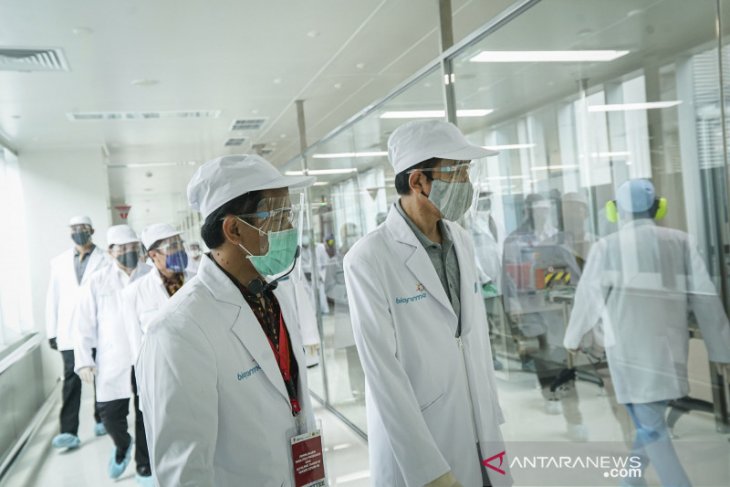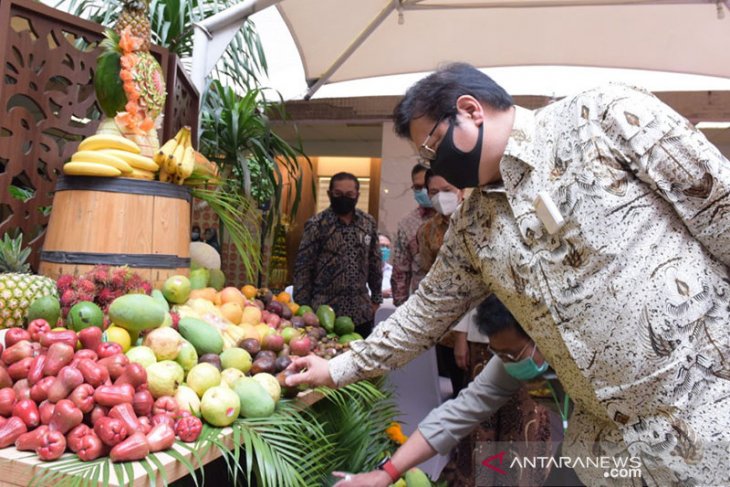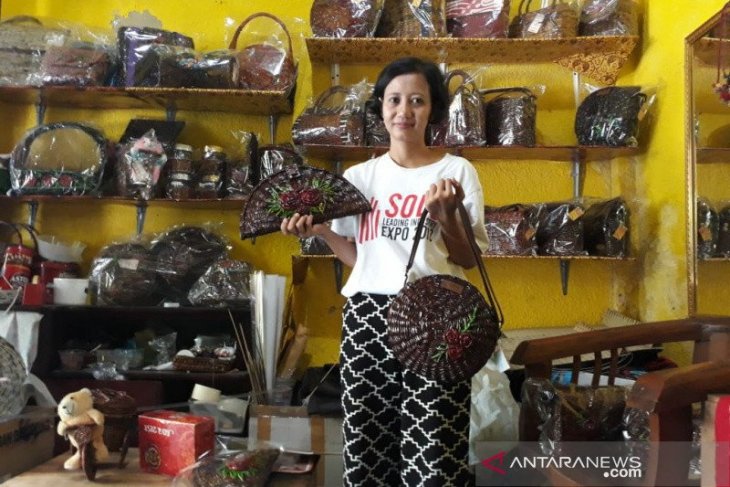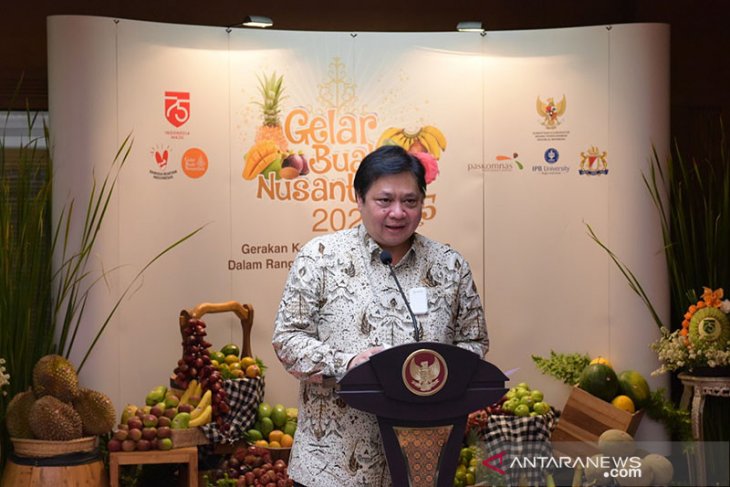Live Streaming
Program Highlight
Company Profile
August
COVID-19 a Reminder of Importance of Knowledge, Technology: President
Written by Ani Hasanah
President Joko Widodo (right), accompanied by head of Bio Farma’s pharmaceutical production division, Hikmat Alitamsar, (left), inspects production facility building 43, which will be used to produce the COVID-19 vaccine, at the Bio Farma office, Bandung, West Java on Tuesday (August 11, 2020). (ANTARA/ Documentation of PT Bio Farma / pras)
President Joko Widodo on Wednesday said the coronavirus pandemic has reminded the nation and the state of the importance of science and technology.
The President made the statement at the commemoration ceremony for the 59th Scout Day, broadcast online from the State Palace in Jakarta on Wednesday.
At the ceremony, the President advised all scout members to work towards mastering science and technology, as well as inculcating discipline and concern for all members of society.
"Solving health problems requires mastery of science and technology, solving economic problems also requires science and technology," he said.
Presidential chief of staff, Moeldoko, and Minister of Youth and Sports, Zainudin Amali, also attended the ceremony, which was organized with the observance of COVID-19 prevention protocols.
The President said that scout members were equipped with discipline and concern for the community. In the future, with the challenges of increasingly fierce international competition, scout members must also master science and technology, he added.
"Remember that the challenges you face will be more severe and complex. The world is changing rapidly and is full of uncertainty. The future will be much different than today," he remarked.
Therefore, he said, scout members must study, gain knowledge to the highest possible level, and continue to care for diversity, Pancasila, and the integrity of the Republic of Indonesia.
"You have to prove your resilience in your pursuit of knowledge. Be an enlightening future generation that continues to build hopes for the glory of Indonesia," the head of state said.
The Scout Day commemoration ceremony is usually held on August 14, but this year, the President is scheduled to give a state speech at the House of Representatives (DPR) and the People's Consultative Assembly (MPR) on the same day. Therefore, the ceremony was held on Wednesday instead. (ANTARA)
August
Government Accelerates Absorption of Budget to Boost Economy
Written by Ani Hasanah
Coordinating Minister for Economic Affairs, Airlangga Hartarto, at the launch of the 5th Indonesian Fruit of the Archipelago on Monday (August 10, 2020) in Jakarta. (ANTARA / HO-Coordinating Ministry for Economic Affairs/pri)
The Indonesian government is making efforts to accelerate the absorption of the budget prepared by it, including the funds allocated for the National Economic Recovery (PEN) program, to boost economic growth.
The government has so far spent Rp1,000 trillion of the Rp2,700-trillion budget, and intends to utilize the remaining Rp1,700 trillion by the end of this year.
There is a need to spur budget absorption to boost growth in the third quarter of 2020 after the negative growth of 5.32 percent seen in the second quarter, said Coordinating Minister for Economic Affairs, Airlangga Hartarto, at the 2020 Work Meeting and National Consultation of the Indonesian Employers' Association (Rakerkonas Apindo), which was broadcast online on Wednesday.
“This third quarter is the determinant for us. From the Rp2,700 trillion prepared under the budget, including the PEN budget, until June, the government has spent Rp1,000 trillion. In the third-fourth quarter, we expect to spend Rp1,700 trillion, that is Rp700 trillion in the third quarter and Rp1,000 trillion in the fourth quarter,” he informed.
Airlangga said this effort is being carried out in accordance with President Jokowi's directions. It is expected that by spurring government spending in each ministry, the economy could return to a positive growth path.
Although Indonesia's economy has recorded negative growth — from the consumption side and government spending to the decline in exports and imports, there are still a number of sectors that are growing positively amid the ongoing slowdown.
Positive growth has still been recorded in the information and telecommunications, water utilities, health services, real estate, agriculture, educational services, and financial services sectors.
Meanwhile, the sectors that have been hit the hardest by the pandemic are accommodation, food and beverage, and land, sea, and air transportation.
"The accommodation, food and beverage, and transportation sector is the government's (current) concern. Because the chair of Apindo is also the chairman of PHRI (Association of Indonesian Hotels and Restaurants), maybe we need to discuss the stimulus that needs to be provided in this sector, because the spending is also domestic. It must be encouraged,” Hartarto said.
Indonesia, he noted, was also one of the few countries whose economic growth was still positive in the first quarter of 2020.
Meanwhile, in the second quarter of this year, other economies fell considerably, for example, Britain showed minus 19 percent, Germany minus 11 percent, France minus 19, Japan minus 8 percent, South Korea minus 2.9 percent, and India minus 18 percent growth.
"If we look at several countries that have implemented a lockdown, (we will find) their economy has been affected more deeply," the minister said.
Airlangga said that as per projections made by various institutions, Indonesia's economy is expected be on a green or positive path in 2021. He then asked for support from stakeholders, including the business world.
Earlier, Airlangga had predicted that Indonesia's economy would grow by minus 0.49 percent in 2020 in wake of the COVID-19 pandemic.
“It is hoped that in the third quarter it (the economy) can improve, with a prediction of minus two, minus one (percent growth), or even, we hope to be positive,” he said at the virtual launch of the Coalition for Action against Corruption (CAC) Indonesia in Jakarta on Tuesday (August 11, 2020).
In his presentation on the economic growth of countries, including Indonesia, the Coordinating Minister had estimated that Indonesia's economy in the third quarter of 2020 would reach minus 1 percent growth.
In the fourth quarter of 2020, economic growth is estimated to improve to a positive growth of 1.38 percent, so the forecast for this year is a negative growth of 0.49 percent. (ANTARA)
August
Ministry Urges SMES to Adapt, Innovate to Survive Covid-19
Written by Nouvarah Ahdiba
The Ministry of Cooperatives and Small Medium Enterprises (SMEs) has urged MSME players to adapt their businesses and focus on product innovation in order to survive the crisis created by the COVID-19 pandemic.
"One of the main things that must be done by MSMEs to survive in this period is (focus on) the necessity for adapting (their) business and exploring product innovation, so that they can adapt to market demand," Special Staff to the Minister of Cooperatives and SMEs, Fiki Satari, said in an online discussion in Jakarta on Wednesday.
In addition, Fiki said that government support for MSMEs in this difficult time is enmeshed with efforts to accelerate the digital transformation of MSMEs so that they can survive and carry out business activities, and also compete in the market.
The micro, small and medium enterprises (MSME) sector has been the most affected by the COVID-19 pandemic. Many MSMEs have lost their source of income and have been unable to pay installments. Many have been forced to close due to reduced income in wake of the pandemic.
During the online discussion on Wednesday, CEO of Midtrans, Erwin Tanudjaja, explained that the use of digital platforms has now become a necessity for MSMEs for selling products.
“We are fully aware, in this current situation, facilitating the transition and adaptation of hundreds of MSMEs in Indonesia to the online realm through digitalization efforts has become a priority,” Erwin said.
Meanwhile, CEO and co-founder, Moka Haryanto Tanjo, said that digital transformation will help MSMEs to survive in this difficult time.
"Not only in terms of online sales, digital-based operational management solutions are also important to be implemented in business," said Haryanto.
By utilizing a digital system in business operations, it is hoped that MSME players will become more responsive in analyzing sales and making important business decisions, he added. (ANTARA)
August
Indonesian Economy is in Better Shape than Other Countries: Minister
Written by Ani Hasanah
Coordinating Minister for Economic Affairs, Airlangga Hartarto, during the launch of the 5th National Fruit Event in Jakarta on Monday (August 10, 2020). (ANTARA/HO-Kemenko Perekonomian/pri)
Despite contracting 5.32 percent year-on-year (yoy) in the second quarter of 2020, the Indonesian economy is still in a better condition compared to several other countries, Coordinating Minister for Economic Affairs, Airlangga Hartarto, said.
“The Indonesian economy last contracted 5.32 percent (in Q2 2020). The contraction also affected other countries. But, Indonesia is still relatively better than other countries that fell deeper (into economic decline),” he said during a discussion in Jakarta on Tuesday.
He said some other countries have suffered a deeper contraction, with the British economy shrinking by up to 19.9 percent, the Hong Kong economy contracting 12 percent, the Singapore economy falling 12.6 percent, and the Indian economy slumping 18 percent.
The third quarter of 2020 offered a significant momentum for the Indonesian economy to rebound, he said.
To that end, the realization of government spending must be able to support the national economy in the third and fourth quarters so that it grows as targeted this year, he remarked.
“We must see the third quarter as an important moment so government spending can support economic growth in the third and fourth quarters,” he said.
In addition, the government must also encourage household consumption, which contracted up to 5.51 percent in the second quarter, and so that it contributes significantly to the national economy, he said.
“As we know household consumption is the main contributor of the Indonesian economic growth. Therefore, market confidence and a safe market are the main priority during this period of time,” he explained.
He noted that several sectors still grew positively in the second quarter in spite of the COVID-19 pandemic. They were the agricultural sector, which grew 2.19 percent; information and communication sector, which expanded 10.88 percent; and, the financial services sector, which grew 1.03 percent.
Several sectors also have shown signs of improvement since June, 2020, including consumer confidence index which rose to 83.8 points in June from 77 a month earlier. (ANTARA)


